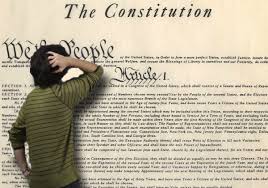We Americans are proud of our democracy, but how many of us understand how it actually works?
Sadly, the answer appears to be… not many.
 “Americans show great uncertainty when it comes to answering basic questions about how their government works.” This according to a recent nationwide survey conducted by the Annenberg Public Policy Center (APPC) of the University of Pennsylvania.
“Americans show great uncertainty when it comes to answering basic questions about how their government works.” This according to a recent nationwide survey conducted by the Annenberg Public Policy Center (APPC) of the University of Pennsylvania.
Released on Constitution Day (Sept. 17th), the survey of over 1400 adults found:
- While little more than a third of respondents (36 percent) could name all three branches of the U.S. government, just as many (35 percent) could not name a single one.
- Just over a quarter of Americans (27 percent) know it takes a two-thirds vote of the House and Senate to override a presidential veto.
- One in five Americans (21 percent) incorrectly thinks that a 5-4 Supreme Court decision is sent back to Congress for reconsideration.
It’s regrettably ironic that so many Americans overwhelmingly disapprove of the job Congress is doing, while so many of those Americans aren’t educated on the basics of how our government is designed or how it works.
The Civics Renewal Network (launched by the APPC and 25 other non-partisan organizations as a means to address the lack of civic understanding) offers resources on their website for teachers of civic education.
iCivics is a website that is integrated with the Civics Renewal Network. Founded by former Supreme Court Justice Sandra Day O’Connor, iCivics works “to develop new and innovative approaches to civic education.”
What does Washington state require in regards to civics education? The class of 2016 civics requirement must include:
- Federal, state, and local government organization and procedures;
- Rights and responsibilities of citizens addressed in the Washington State and United States Constitutions;
- Current issues addressed at each level of government; and
- Electoral issues, including elections, ballot measures, initiatives, and referenda.
In order to feel invested in their democracy, the people need to understand just how it works. Civic education should an important educational priority.
